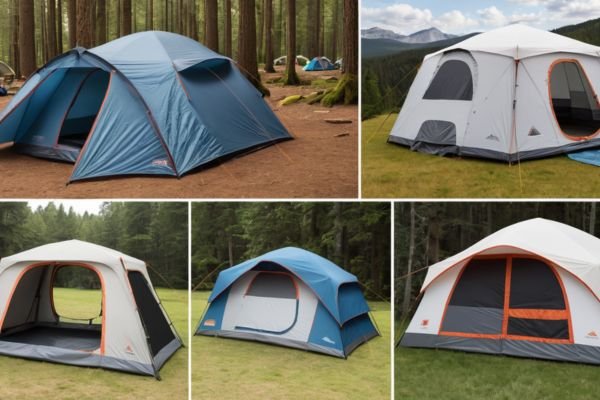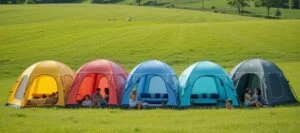Choosing the right tent size can make or break your camping experience. Whether you’re embarking on a solo adventure, planning a romantic getaway, or organizing a family camping trip, selecting the perfect tent involves more than just counting heads. This guide will help you navigate the key factors to determine what size tent you really need for your outdoor escapades.
Understanding Tent Size Labels: What Do They Mean?
When shopping for tents, you’ll notice they’re labeled based on occupancy: 1-person, 2-person, 4-person, and so on. However, these labels are often misleading, as they assume minimal space per person—essentially enough room for a sleeping bag and not much else. Here’s why you should look beyond the label:
- Minimal Fit: Tent sizes are measured to fit occupants lying shoulder to shoulder. If you value extra space for gear or comfort, consider sizing up.
- Gear Storage: Occupancy ratings typically don’t account for backpacks, boots, or other camping essentials that also need space.
- Personal Preferences: If you toss and turn at night or simply enjoy extra elbow room, a larger tent may be more suitable.
Pro Tip: Always check the tent’s dimensions (floor area and peak height) rather than relying solely on occupancy ratings.
Tent Size for Solo Campers: Minimalism vs. Comfort
If you’re camping alone, you have the luxury of focusing entirely on your needs. Here’s how to decide what size works best:
- 1-Person Tents: Lightweight and compact, these are perfect for backpackers aiming to minimize pack weight. However, they offer very little space beyond sleeping.
- 2-Person Tents for Solo Use: For solo campers who value extra room for gear or want more comfort, a 2-person tent is often a better choice.
Ideal Use: A 1-person tent is great for ultra-light backpacking, while a 2-person tent works better for general camping trips.
Tent Size for Couples: Finding the Sweet Spot
Camping as a couple can be a cozy and memorable experience, but only if you choose the right tent size. Here are your options:
- 2-Person Tents: These are the default choice for couples and offer just enough space for two sleeping bags. However, if you want room to sit up or store gear, it may feel cramped.
- 3-Person Tents: A 3-person tent provides extra wiggle room for gear and nighttime comfort, especially if you’re camping in colder weather and need to keep backpacks inside.
- Double Doors and Vestibules: Look for tents with two doors and vestibules to make entry and exit easier and to store gear outside the sleeping area.
Key Consideration: Think about how much time you’ll spend inside the tent. For short trips, a snug 2-person tent might be fine, but for longer trips, you’ll appreciate the extra space a 3-person tent offers.
Tent Size for Families: Planning for People and Gear
Family camping trips are all about creating fun memories, but they can turn stressful if the tent is too small. When choosing a tent for families, prioritize these factors:
- Occupancy Ratings: For families, always size up. A 4-person tent is more suitable for three people with gear, and a 6-person tent works better for four or five people.
- Multi-Room Tents: Consider tents with multiple compartments or dividers, which provide privacy and help keep things organized.
- Height and Floor Space: Kids love to move around, and adults appreciate the ability to stand up. Look for tents with higher ceilings and a generous floor plan.
- Gear Storage: Family camping involves more gear—coolers, sleeping bags, toys, and cooking supplies. Ensure there’s ample space for everything without overcrowding the sleeping area.
Example: A family of four with young children may find a 6-person tent ideal, while a larger family may need an 8-person tent with additional vestibules or screened porches.
Factors Beyond Size: What Else to Consider?
Tent size is just one piece of the puzzle. To truly enjoy your camping trip, consider these additional factors:
1. Portability and Weight
- Solo Campers and Couples: Backpackers need lightweight tents, so a compact size is essential. Opt for tents under 5 pounds if you’re carrying them long distances.
- Families: For car camping, weight is less of a concern. Focus on durability and ease of setup instead.
2. Ease of Setup
- Large tents can be challenging to set up, especially for families with young kids. Look for tents with color-coded poles or quick-pitch systems.
- Solo campers should prioritize tents that are easy to assemble single-handedly.
3. Seasonal Considerations
- 3-Season Tents: These are versatile and suitable for spring, summer, and fall camping. They’re lightweight but may lack the durability needed for harsh conditions.
- 4-Season Tents: Designed for extreme weather, these are bulkier and better suited for winter camping.
Real-Life Examples: Matching Tent Size to Scenarios
Here’s how tent sizes can work for different camping setups:
- Solo Backpacker on a Weekend Trip: A compact 1-person tent like the Big Agnes Fly Creek HV UL1 offers lightweight convenience.
- Couple on a Romantic Getaway: A 3-person tent like the MSR Elixir 3 provides enough room for comfort and gear storage.
- Family of Four Car Camping: A spacious 6-person tent like the Coleman Montana 6 ensures everyone has space to relax and store essentials.
Common Mistakes to Avoid
- Underestimating Gear Needs: Don’t forget that you’ll need room for backpacks, sleeping pads, and other essentials. Always account for extra space when choosing a tent.
- Ignoring Peak Height: For family or group camping, tents with higher ceilings provide a more comfortable experience.
- Overestimating Weight Capacity: A bigger tent isn’t always better if you’re hiking long distances. Balance size with portability.
Final Thoughts: Choose Comfort Over Capacity
When deciding what size tent you need, comfort should be your guiding principle. While it’s tempting to go for the smallest, lightest option, a slightly larger tent can vastly improve your camping experience. For solo campers, consider sizing up for extra gear storage. Couples will appreciate a bit of extra room for comfort, and families should prioritize spacious designs to accommodate everyone.
The right tent ensures restful nights and memorable adventures. So, take your time, think about your specific needs, and invest in a tent that feels like the perfect fit for your camping style. Happy camping!
Reviewed and updated on 01/24/2025




